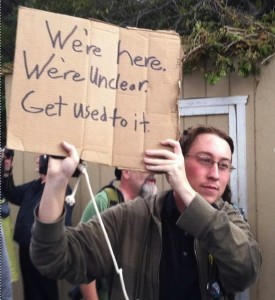
Photo credit: Jeffrey H. Campagna
One young man in Zuccoti Park in New York, part of the Occupy Wall Street encampment, holds up a sign which boldly declares: “We’re here, we’re unclear, get used to it.” This tongue in cheek message gets to the heart of what is uncomfortable for many in the media and the chattering class about the Occupy movement (OWS and its many many offshoots in all major American cities and many cities around the world). There is an expected, almost ritual nature to American political discourse. There are critiques, followed by demands, supported by emotional anecdotes and statistics, followed by the suggestion of legislative remedies. The chattering class then gets to work vetting these remedies on two levels. First, and most important, is the “horse race” analysis. The political climate will not allow this or the votes are there but only if the opposing party will compromise on this. And so on and so forth. Somewhere farther down, or on the inside pages, the wonks get to work dissecting the numbers. Within a week at most (usually a news cycle), its all old news. Nothing has changed. Perhaps a catch phrase has been added to the stump speech of this or that candidate.
It is very frustrating when a large group of Americans peacefully assemble to air their grievances without participating in these tried and true rituals. When they do not attempt to position themselves behind a candidate or leverage a powerful constituency, but, rather display their disaffection without feeling the need to issue bullet points which any politician or pundit could easily digest and regurgitate. And then they stick around. For a long time. And they do not feel the pressure of the news cycle to make decisions or appoint telegenic spokespeople. They just put up tents, hold long meetings which need to reach a consensus for a decision, put themselves in danger by reclaiming public space and using non-violence as a trigger and a weapon to reveal the repressive reflexes of the financial and political elites. It is maddening. Continue reading →

